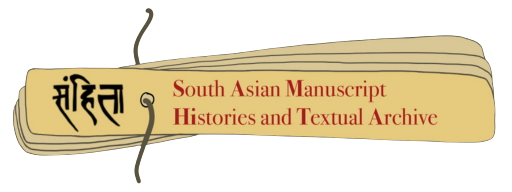Manuscripts
Search Filter
Skandapurāṇa
EAP1023/25/37 Language : Sanskrit Scripts : Bengali
This manuscript contains 22 chapters of the Kedārakhaṇḍa, the first part of the first book (‘Maheśvarakhaṇḍa’) of the Skandapurāṇa.
Prayogaratnam
EAP1023/25/38 Language : Sanskrit Scripts : Devanagari
Also known as Smārtānuṣṭhānapaddhati, this is a dharmaśāstra text by Ananta, son of Viśvanātha, and is based on the work of the same title by Nārāyaṇa Bhaṭṭa (1513 CE). It discusses 25 saṃskāra-s according to the Āśvalāyana-smṛti, as well as svastivācana, puṇyāhavācana, sthālīpāka, paribhāṣā, prāyaścitta (Kane 1957).
Daśakarma
EAP1023/25/39 Language : Sanskrit Scripts : Devanagari
A text on 10 saṃskāra-s (life-cycle rituals) observed by Hindus: garbhādhāna, puṃsavana, sīmantonnayana, jātakarma, nāmakaraṇa, niṣkramaṇa, annaprāśana, cūḍākaraṇa, karṇavedha, upanayana and samāvarttana. The manuscript was written by Kṛṣṇa Śarman in Śaka 1747 (1825 CE).
Brahmottara-khaṇḍa
EAP1023/25/40 Language : Sanskrit Scripts : Devanagari
This contains Chapters 1–21 of the Brahmottarakhaṇḍa in the Skandapurāṇa (‘Pañcākṣaramahimāvarṇana’ to ‘Rudrādhyāyamahimānuvarṇana’) and half of Chapter 22.
Mahābhārata Droṇaparva
EAP1023/25/41 Language : Sanskrit Scripts : Devanagari
The seventh of 18 books of the Mahābhārata, the Droṇaparva describes Droṇa’s appointment as commander-in-chief of the Kaurava alliance on the 11th day of the Kurukshetra War, and his death on the 15th day. The manuscript was written by Viṣṇuśarman in Kāntipura in Saṃvat 1871, Śaka 1736 (1814 CE). The first folio is missing.
Dinakaroddyota
EAP1023/25/42 Language : Sanskrit Scripts : Devanagari
A text on dharmaśāstra started by Dinakara Bhaṭṭa (grandson of Nārāyaṇa Bhaṭṭa and son of Rāmakṛṣṇa Bhaṭṭa) and completed by his son Viśveśvara alias Gāgā Bhaṭṭa. The manuscript was written by Śuklānanda in Saṃvat 1974 (1917 CE).
Vidhānapārijāta
EAP1023/25/44 Language : Sanskrit Scripts : Devanagari
The fourth of five stavaka-s of a ritual manual authored by Ananta Bhaṭṭa, son of Nāgadeva Bhaṭṭa, in Varanasi in 1625 CE (NCC Vol. 29). The fourth stavaka discusses types of dāna (donation), citing as prāmāṇya (authorities) works like Taittirīya śruti, Vājasaneya, Matsyapurāṇa, Agnipurāṇa, Brahmapurāṇa, Padmapurāṇa and Skandapurāṇa.
Pāraskaragṛhyavyākhyā
EAP1023/25/45 Language : Sanskrit Scripts : Devanagari
A commentary by Harihara on the Gṛhyasūtra-s of Paraskara which are concerned with Vedic domestic rituals, and belong to the Śukla (White) Yajurveda, forming an appendix to Kātyayāna’s Śrauta Sūtra. The text has three kāṇḍa-s, Sthālīpāka (with 19 kaṇḍikā-s), Sītāyajña (17 kaṇḍikā-s) and Navānnaprāśana (15 kaṇḍikā-s). The manuscript contains the first two kāṇḍa-s and the beginning of the third.
Vidhānapārijāta
EAP1023/25/43 Language : Sanskrit Scripts : Devanagari
The fifth of five stavaka-s of a ritual manual authored by Ananta Bhaṭṭa, son of Nāgadeva Bhaṭṭa, in Varanasi in 1625 CE (NCC Vol. 29), this discusses death rituals, like bhūmitailaraupyādimānam, āsannamṛtyuvaitaraṇyādidāna, anekamaraṇasannipātanirṇaya, tripiṇḍīvidhi, aśaucavidhi, śāvāśauca and anugamanāśauca. The rest of the manuscript may be read at EAP1023/28/4 (Stavaka 1), EAP1023/28/3 (Stavaka 2), EAP1023/28/2 (Stavaka 3), and EAP1023/25/44 (Stavaka 4).
Agastyārghavidhi
EAP1023/16/19 Language : Sanskrit Scripts : Devanagari
A ritual manual on the pūjā for the Vedic sage Agastya, which the NCC records as found in the Bhavisyottarapurana (NCC Vol. 1, 27). Some lines are similar to those in the Śrāvaṇamāsamāhātmya from the Skandapurāṇa. The scribe Śrīnātha wrote this manuscript for his yajamāna in Śaka 1788, Saṃvat 1923 (1866 CE).
Pitṛsūktam
EAP1023/16/18 Language : Sanskrit Scripts : Devanagari
The Pitṛsūktam is recited for the peace of departed ancestors. The title is written in pen as ‘Pitṛsūktam’ on the first folio but the manuscript contains only part of it, and also contains other mantras like the Puruṣasūkta (Ṛgveda) and Rudrāṣṭādhyāyī (third pāṭha, from the Śukla Yajurveda).
Rāmanavamīvratapujāvidhi
EAP1023/16/17 Language : Sanskrit Scripts : Devanagari
A ritual manual on Rāmanavamīpūjā, performed to celebrate Rāma’s birth on Navami, the ninth day of the Navaratri festivities.













